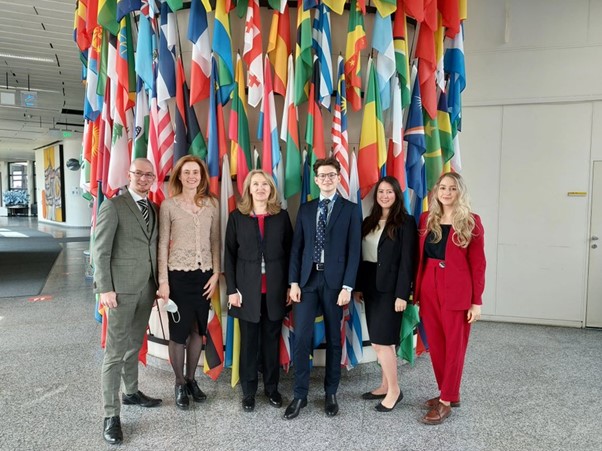
During the first Review Conference of the Convention on the Physical Protection of Nuclear Material as amended (A/CPPNM), held in Vienna from 28 March until 1 April 2022, a delegation from the VCDNP shaped discussions through side events and official conference participation.
The VCDNP hosted a hybrid event with U.S. Under Secretary of State for Arms Control and International Security Bonnie D. Jenkins, who set out U.S. objectives for the Conference and advocated for more diversity in nuclear policy. VCDNP Visiting Research Fellow Marianne Nari Fisher presented recommendations for enhanced implementation and universalization of the Convention. VCDNP Executive Director Elena K. Sokova also contributed to side events on the role of NGOs in nuclear security, and on female supporters of the A/CPPNM.

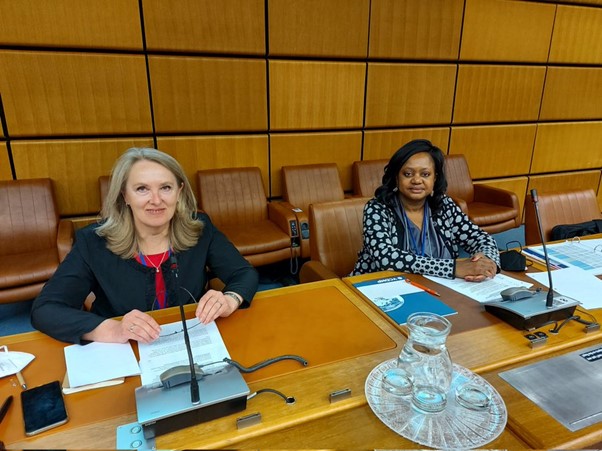
During this side event on 29 March 2022, Ambassador Jenkins discussed U.S. priorities for the Conference, including the A/CPPNM’s universalization and full implementation, global exchanges on best practices and emerging threats, and establishing a regular review process.
Ambassador Jenkins stressed that a strong nuclear security regime was key to expanding access to peaceful uses of nuclear technologies globally. Therefore, the international community had to be attuned to the challenges emerging technologies and a changing threat landscape posed to nuclear security. Ambassador Jenkins added that low awareness of the assistance available to help States implement the Convention was the main obstacle to universalization. She called on international, regional, and non-governmental organizations to further their work on capacity building and outreach to States that are not yet party to the Amendment.
During the discussion, audience members raised important questions on diversity amongst nuclear policy professionals. Ambassador Jenkins, also the founder of Women of Color Advancing Peace and Security (WCAPS), stressed the importance of including diverse perspectives, noting that “we do not know what we miss out on when we do not invite all parties to the table.” She advocated for increased efforts to ensure that women were represented in leadership positions across the field, and for better inclusion and engagement of people of color.
The event was organized with the U.S. Mission to International Organizations in Vienna and moderated by VCDNP Executive Director Elena K. Sokova.
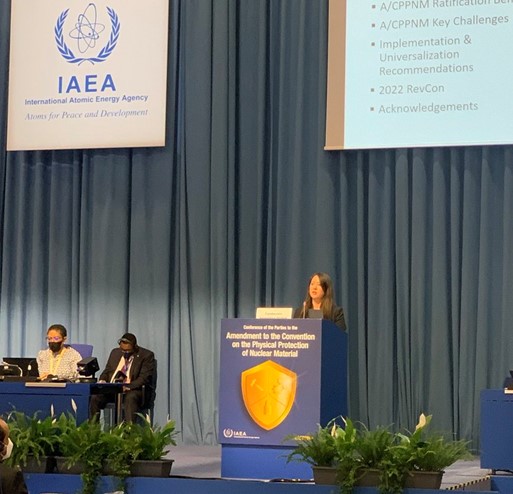
VCDNP Visiting Research Fellow Marianne Nari Fisher presented concrete recommendations for the implementation and universalization of the A/CPPNM at the Session with Non-Governmental Organizations on 29 March 2022.
Based on the findings in the VCDNP report Accession to and Impact of the Amendment to the Convention on the Physical Protection of Nuclear Material on States Parties, Ms. Fisher suggested improvements that would help States ratify and implement the Convention as amended, including:
The report included a survey of 28 States Parties to the CPPNM from all continents and with a diverse range of nuclear activities, as well as insights from senior experts and diplomats collected during a VCDNP workshop. The report sought to assess the legislative, financial, and operational impact of implementing the A/CPPNM on States Parties to better understand universalization hurdles.
Ms. Fisher summarized that the majority of States Parties surveyed had faced neither significant financial nor legislative burdens from implementing the A/CPPNM. The study also showed broad agreement among States Parties that implementation provided significant benefits, such as generating domestic momentum for enhancing nuclear security, clarifying internal responsibilities, and facilitating greater international and regional cooperation, mutual trust, and confidence.
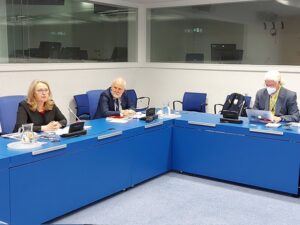
VCDNP Executive Director Elena K. Sokova discussed major ways NGOs and civil society support global and regional nuclear security at the side event organized by the Stimson Center on 29 March 2022.
Ms. Sokova noted that NGOs contribute greatly by bringing diversity to the field and conducting research on risks and solutions, facilitating a dialogue between various stakeholders, as well as by providing a venue for them to build connections. On the latter, she specifically highlighted VCDNP webinars and seminars as a notable example of such a platform.
She continued by underlining the importance of NGOs’ capacity-building efforts in preparing next-generation specialists by providing numerous opportunities like internships and mentorships such as the Young Women and Next Generation Initiative launched by the VCDNP and the International Affairs Institute in the framework of the EU Non-Proliferation and Disarmament Consortium.
Ms. Sokova also stressed that the VCDNP organizes training programs for different practitioners ranging from diplomats to technical specialists. Such programs benefit from NGOs’ ability to blend technical and policy aspects to address both sides of the issue, which is especially valuable when it comes to the nexus between nuclear security and peaceful applications of nuclear science and technology. NGOs and civil society can also assess existing policies and keep governments accountable by influencing the implementation and evaluation processes.
Ms. Sokova called on international organizations and NGOs to address all kinds of disparities in the field and pointed out the International Gender Champions initiative as a crucial initiative, though which leaders commit to promoting and ensuring diversity and inclusivity.
During the closing side event of the A/CPPNM Review Conference dedicated to women’s role in bolstering and implementing the Convention as amended, Elena K. Sokova moderated the panel on building networks among women. The event was organized by Argentina and started with welcoming remarks by Ms. Victoria Roston, responsible for the Nuclear Security Policies Activity at the Nuclear Regulatory Authority of Argentina.
Ms. Sokova opened the discussion by acknowledging Argentina’s efforts to organize such a crucial panel. She continued by underlining the importance of building an inclusive network and working on diversity policies.
“The main goal of bridge-building efforts is to connect people and promote diversity.”
Ms. Sokova highlighted the work of the Vienna Chapter of the International Gender Champions Initiative, VCDNP Young Women and Next Generation Initiative, and the Black Sea Women in Nuclear Network.
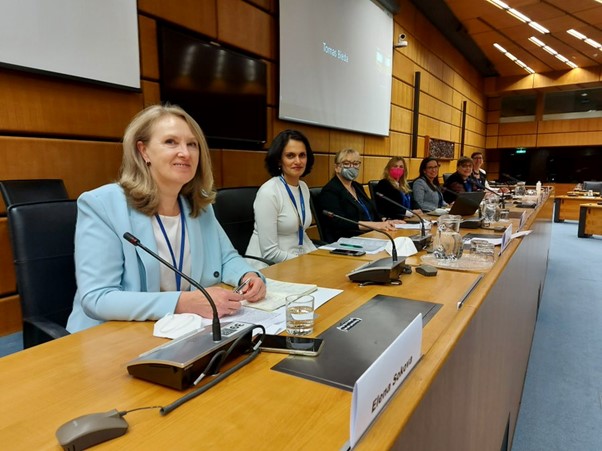
Ms. Naina Thoppil, Deputy Director of Global Affairs Canada, pointed out that women have a key role to play in the nuclear security network. The representation of women helps to achieve better results within organizations. Women enjoy working in the field but many stress that getting rewarded is a challenge, especially in nuclear security. They look for mentorships, and organizations should provide them. Ms. Thoppil continued by naming specific efforts in bolstering women supported by Canada.
Ms. Mirela Gavrilas, Director of the Office of Nuclear Security and Incident Response at the U.S. Nuclear Regulatory Commission, elaborated on the potential individual efforts and drew attention to the importance of having networks – for recruitment and retaining women. Ms. Gavrilas added that sharing experience is vital as well. She concluded by emphasizing that nurturing gender champions may further the mainstream.
“Inclusion is hard as it takes deliberate effort. We need to put this effort into everything we do.”


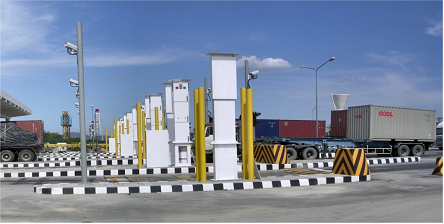

By continuing to use the site, you agree to the use of cookies. more information
The cookie settings on this website are set to "allow cookies" to give you the best browsing experience possible. If you continue to use this website without changing your cookie settings or you click "Accept" below then you are consenting to this.